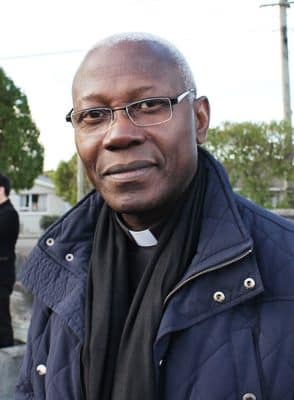The Apostolic Nuncio to New Zealand has said that working and praying for peace must involve defeating mentalities and ideologies that seek to put aside the human right to life and the human right to exist.

Archbishop Novatus Rugambwa
Archbishop Novatus Rugambwa spoke about this at a Mass for Peace in Ukraine, celebrated at St Teresa’s Pro-Cathedral in Karori, Wellington, on March 17. He made his remarks after thanking members of the Diplomatic Corps and others for their presence at the Mass.
The archbishop quoted the constitution of UNESCO, adopted in 1945, that stated “since wars begin in the minds of men, it is in the minds of men that the defences of peace must be constructed”.
After noting the power of prayer and fasting for peace, Archbishop Rugambwa asked – who is it that can effectively change the human heart and mind?
“Only God can change our mind and heart; his grace is powerful and, for him, nothing is impossible,” he said.
“Pope Francis’ appeal for prayer for peace is an invitation to collaborate with the grace of God in order to construct true peace, and to bear in our minds and hearts that every human person is created in God’s image and likeness and, for that matter, we are brothers and sisters in God who created us all.
“Wars are – among other things – the negation that we are all created in the image and likeness of the same God and that every human life is sacred,” Archbishop Rugambwa continued. “Consequently, war is when any human life is disregarded or is considered as a threat, and as something that should be eliminated.
“Any culture that entertains ideas, ideologies, and social, political, religious and legal systems opposed to the human life – at any stage of its development – generates in the society the mentality, not only to despise the human life, but also to justify its elimination.
“Prayer for peace, just as diplomatic and other efforts to stop hostilities, should not be confined to the silencing of arms and the signing of peace treaties; they should also construct the defences of peace by seeking to eradicate from our society all ideologies and mentalities that can lead men and women to violate the human being’s right to live and the right to exist. Our prayers and our fasting should also aim at inculcating in our minds and hearts the ‘sacredness’ of all human life, and at avoiding all that leads to the culture of death.”
Archbishop Rugambwa asked those at the Mass to “continue to pray for Ukraine, and for many other parts of the world that are experiencing armed conflicts generated by the rampant mentality to disregard, discard and to eliminate . . . human life”.
“Let us hope and pray that diplomacy will be given a chance to successfully play its role in obtaining true peace and development among the nations,” he added.
Cardinal John Dew presided at the Mass, and in his homily noted that “war is never glorious”.
He recalled his visit to France a few years ago to visit the grave of his grandfather, who was killed in the final days of World War I. The cardinal reflected on the pain and suffering that comes from war.
“War is a trauma that lingers deep in our hearts, and that is why we feel profound disquiet at this time. We need to pray.”
Speaking of the war in Ukraine, Cardinal Dew said that “we weep for those on whom this war has been inflicted. We can only imagine the gut-wrenching turmoil for the people of Ukraine as they defend their homeland, and as they also seek safety for their children and the vulnerable”.
The cardinal added that God knows what the people of Ukraine are going through.
“We pray that all Ukrainians know something of the comforting presence of Christ.”
Near the end of his homily, Cardinal Dew said that “none of us are likely to be in a position of being able to influence the Russian President or the course of this war . . . some of you from the Diplomatic Corps will have colleagues around the world who are active in this noble task”.
“Here in Aotearoa, our call and our gift is to pray.”
Archbishop Rugambwa, who had organised the Mass, thanked Cardinal Dew for agreeing to preside, and also thanked the Dean of the Diplomatic Corps, the High Commissioner of Samoa, for facilitating the invitations to the Mass.
Reader Interactions